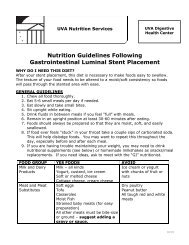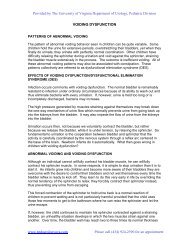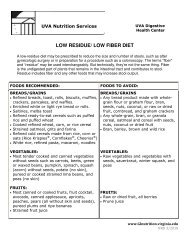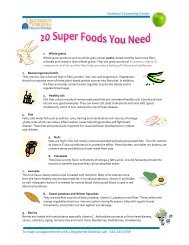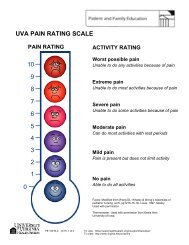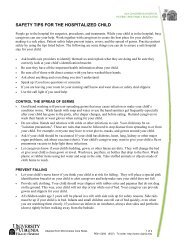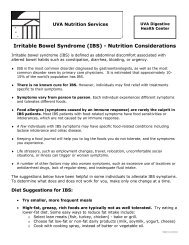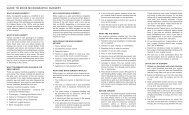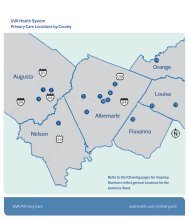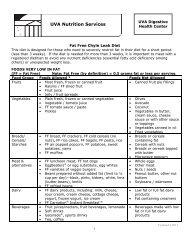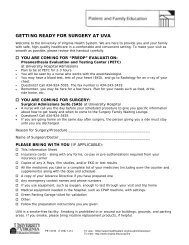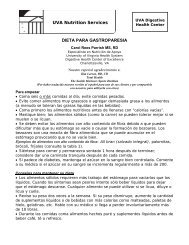ADULTS HAVING SURGERY - University of Virginia Health System
ADULTS HAVING SURGERY - University of Virginia Health System
ADULTS HAVING SURGERY - University of Virginia Health System
You also want an ePaper? Increase the reach of your titles
YUMPU automatically turns print PDFs into web optimized ePapers that Google loves.
<strong>ADULTS</strong> <strong>HAVING</strong> <strong>SURGERY</strong><br />
GETTING READY<br />
Please read this booklet to help you get ready for surgery.<br />
All information is for your safety and should be followed. Please ask questions and take<br />
notes to be sure you know everything you need to know about your surgery.<br />
Your visit to the Preanesthesia Evaluation and Testing Center (PETC) will take 1-2 hours.<br />
You may have a blood test, an x-ray <strong>of</strong> your chest, a test <strong>of</strong> your heart (EKG).<br />
Bring all your medicines with you and any papers from your regular doctors.<br />
The nurse from the Anesthesia Department will ask you questions about your health.<br />
He/she will talk to you about your medicines (over the counter and herbal remedies), diet,<br />
activities, and pain management. The nurse will answer any questions you may have<br />
about getting ready for surgery.<br />
We have information for you about pain control, relaxation exercises, and other hospital<br />
services. You may also arrange to have 1 or 2 adult Care Partners who can be active<br />
members <strong>of</strong> your health care team while you are in the hospital. Please ask us for more<br />
information about this program.<br />
If you take aspirin products or blood thinners, tell your surgeon so you will know when to<br />
stop taking them before surgery.<br />
If you get sick with a cold, fever, flu symptoms, tell your surgeon before the day <strong>of</strong><br />
surgery.<br />
Please note – if you are going home on the same day as your surgery, you must have an<br />
adult driver take you home and stay with you the first night.<br />
<strong>SURGERY</strong> SAFETY STEPS:<br />
• Information on the consent form will be explained to you before you sign it. Be sure you<br />
have all your questions answered so you know what will happen and what to expect.<br />
• We will put an identification band on your arm. Staff will ask you (or your family) to<br />
say your name and birthday (or other identifying information). If you are unable to<br />
speak and are alone staff will work together to confirm your identity clearly.<br />
• We will ask what type <strong>of</strong> surgery you are having and the location on your body. If your<br />
surgery involves left or right limb or body side, or has multiple sites (like fingers and<br />
toes), the site will be marked on your body by the doctor or other member <strong>of</strong> the<br />
surgical team.<br />
• Just before the procedure begins, everyone in the room will take a short “time out” and<br />
check that they are doing the right procedure on the right patient in the right place.<br />
This may happen after you are asleep.<br />
• We prevent infections by careful hand washing and giving antibiotics, if needed.<br />
PE 14002 (2/10) 1 <strong>of</strong> 4 To view: https://www.healthsystem.virginia.edu/intranet/per/<br />
To order: http://www.virginia.edu/uvaprint/
THE DAY BEFORE <strong>SURGERY</strong><br />
For your safety and comfort, patients and families must read, understand, and follow the<br />
guidelines for eating, drinking and taking medications. If the guidelines are not followed,<br />
your surgery may be delayed or cancelled.<br />
A nurse will call you between 2:30pm and 6:00 pm to tell you what time you should come<br />
to the hospital. Your surgery will begin at least two hours after you arrive.<br />
If there is a block on your phone, please call us. If you are staying at a hotel, please tell us<br />
where you are staying and the name on the registration. You can call us after 2:30 pm at<br />
434-924-1248.<br />
Instructions for food, liquid and medicines before arrival time<br />
• Do not eat ANY solid food or drink soup, milk products, jello, or orange, grapefruit or<br />
tomato juice after midnight.<br />
• If you take medicines crushed in food (like applesauce) take the last medicine 6 hours<br />
before arrival time.<br />
• Do not chew gum or tobacco products after midnight.<br />
• Until 2 hours before arrival time you may drink clear liquids only.<br />
○ Examples <strong>of</strong> clear liquids: water, apple juice, clear soda, and popsicles<br />
If you have diabetes keep your blood sugar between 90 and 150 mg/dl.<br />
THE DAY OF <strong>SURGERY</strong> Arrival Time ____________<br />
• During the last 2 hours before arrival time do not chew, eat or drink anything.<br />
• You may take medicines with a sip <strong>of</strong> water as told by your surgeon. (Medicines for<br />
diabetes, fluid, pain, and blood thinners may have special instructions).<br />
• If you are going home the same day after surgery you MUST have a responsible adult<br />
take you home and stay with you overnight.<br />
Bring the following with you:<br />
• Do bring your “blood” bracelet, if given.<br />
• Do wear comfortable, loose clothes<br />
• Do bring insurance cards<br />
• Do bring all medicines and follow all instructions given<br />
• Do bring lip balm to apply to your lips after surgery<br />
When you arrive, check in to the Surgical Family Waiting Lounge on the first floor <strong>of</strong> the<br />
hospital. There is not much space so do not bring belongings or extra people. Any extra<br />
clothes or money can be safely locked in your car for after your recovery or sent home.<br />
Leave these at home:<br />
• Do not wear jewelry including wedding bands or body piercings.<br />
• Do not wear make-up, hairpins, nail polish, and contact lenses.<br />
• Do not bring extra luggage, clothing or money to the hospital.<br />
<strong>ADULTS</strong> <strong>HAVING</strong> <strong>SURGERY</strong> 2 OF 4
YOUR <strong>SURGERY</strong><br />
When it is time for you to get ready for surgery you will go to the Surgical Admission Suite<br />
(SAS). One family member can be with you until you go into the operating room.<br />
While you are in surgery your family will wait in one <strong>of</strong> the hospital waiting rooms.<br />
We will recheck your identification and the type and place <strong>of</strong> your surgery. Please ask<br />
questions and let us know if you need anything.<br />
The nurse will take your vital signs, review your health history and answer your questions.<br />
You will get a needle in your arm (IV) for fluid and medicine.<br />
Your anesthesiologist will review your health history and blood tests, tell you what will<br />
happen, and answer your questions.<br />
You will be taken into the Operating Room (OR). There will be many people there to keep<br />
you safe and comfortable at all times. You will be helped onto the table.<br />
AFTER YOUR <strong>SURGERY</strong><br />
You will be taken to the Post-Anesthesia Care Unit (PACU) to recover.<br />
Your surgeon may want you to spend time in the Intensive Care Unit (ICU).<br />
You will be in the PACU for at least 30 minutes but <strong>of</strong>ten longer. Tell your nurse if you feel<br />
very sleepy, cold, have a sore throat, or feel sick. Please let the nurse know if you have<br />
pain.<br />
Family and friends that are waiting for you will be called in about an hour and again<br />
regularly until you leave the PACU.<br />
To help you recover, you must cough and take deep breaths when the nurse asks you.<br />
We want you to be as comfortable as possible. We will ask you about your pain and help to<br />
manage it after surgery.<br />
IF YOU ARE ADMITTED<br />
You will then be taken to your hospital room. Our Patient Handbook will give you<br />
information about the hospital and our services.<br />
IF YOU ARE GOING HOME THE SAME DAY<br />
• You will be taken back to Surgical Admission Suite to get ready to go home.<br />
• You may be sleepy or dizzy so you must have a responsible adult driver to take you<br />
home and stay with you overnight.<br />
• Verbal and written instructions will be given to you and your family. Please follow these<br />
instructions carefully and feel free to ask questions or voice concerns.<br />
• Take it easy for a few days.<br />
• Call if you have any questions when you get home.<br />
• A nurse will call you in a few days to see how you are feeling and ask about your care at<br />
the UVa <strong>Health</strong> <strong>System</strong>.<br />
<strong>ADULTS</strong> <strong>HAVING</strong> <strong>SURGERY</strong> 3 OF 4
IMPORTANT TELEPHONE NUMBERS<br />
Preanesthesia Evaluation and Testing Center (PETC) 434-924-1248<br />
Surgical Admission Suite (SAS) 434-924-5455<br />
UVa Toll free number for all UVa Services 1-800-251-3627<br />
UVa Page Operator 434-924-0000<br />
Your Surgeon (Name & Phone) _________________________________<br />
Time to get to hospital_______________________<br />
For a tour <strong>of</strong> all the surgery areas see:<br />
http://www.healthsystem.virginia.edu/internet/periop/ and click on “<br />
virtual tour”<br />
For more information about your health see: www.uvahealth.com<br />
Take these medicines in<br />
the morning with a sip <strong>of</strong><br />
water<br />
Do not take these<br />
medicines<br />
<strong>ADULTS</strong> <strong>HAVING</strong> <strong>SURGERY</strong> 4 OF 4




